
A flatfish is a member of the ray-finned demersal fish order Pleuronectiformes, also called the Heterosomata, sometimes classified as a suborder of Perciformes. In many species, both eyes lie on one side of the head, one or the other migrating through or around the head during development. Some species face their left sides upward, some face their right sides upward, and others face either side upward.
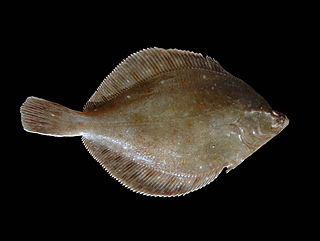
Pleuronectidae, also known as righteye flounders, are a family of flounders. They are called "righteye flounders" because most species lie on the sea bottom on their left sides, with both eyes on their right sides. The Paralichthyidae are the opposite, with their eyes on the left side. A small number of species in Pleuronectidae can also have their eyes on the left side, notably the members of the genus Platichthys.
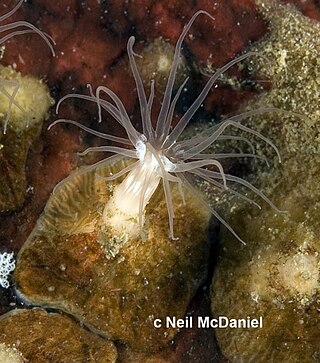
Octineon is the sole genus of sea anemones in the monotypic family Octineonidae.
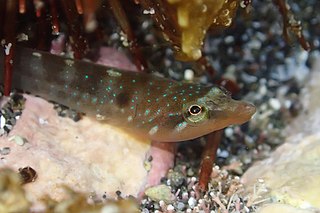
The New Zealand urchin clingfish is a clingfish. It is found around New Zealand wherever sea urchins are present. Its length is between 2 and 3 cm.

The common sole, Dover sole, or black sole is a species of flatfish in the family Soleidae. It is one of the largest fish in the Solea genus. It lives on the sandy or muddy seabed of the northern Atlantic and the Mediterranean Sea where it often semi-immerses itself in the substrate. The upper side is greyish-brown while the underside is white. It grows to a maximum length of about 70 cm (28 in). The species is prized as a food fish, being caught mostly by trawling on the seabed.

Phocinae is a subfamily of Phocidae whose distribution is found in the seas surrounding the Holarctic, with the Baikal seal being the world's only freshwater species of pinniped. What distinguishes them from other phocid seals is the presence of well-developed claws on their front and back flippers. The Phocinae is divided into three extant tribes: Erignathini, Cystophorini, and Phocini. Members of both Erignathini and Cystophorini have 34 chromosomes, while species in the tribe Phocini have 32 chromosomes.
Terlinguachelys fischbecki is an extinct sea turtle that existed during the Late Cretaceous period some 80 million years ago. It is the sole species in the genus Terlinguachelys and is classified in the family Protostegidae along with other extinct marine turtles.
Arhythmacanthidae is a family of parasitic worms from the order Echinorhynchida.
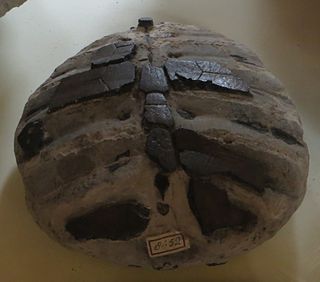
Puppigerus is an extinct genus of sea turtle from the Eocene. It is known from finds in the United States, the United Kingdom, Belgium, Denmark, and Uzbekistan.
Ixorheis is a genus of parasitic alveolates in the phylum Apicomplexa.
Barnardichthys fulvomarginata, the lemon sole, is a species of sole endemic to the coasts of South Africa. This species is the only known member of its genus.

Microchirus is a genus of soles native to the Eastern Atlantic Ocean and Mediterranean Sea.
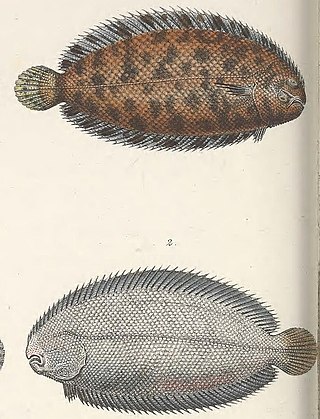
Monochirus is a genus of small soles. It contains two species; one from the northeast Atlantic and Mediterranean, and the second from the South China Sea.
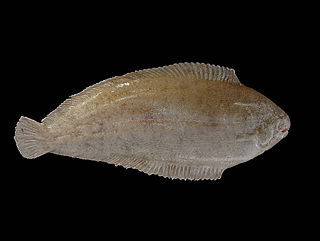
Solea is a genus of soles from the Indo-Pacific and East Atlantic Oceans, and the Mediterranean Sea.

Synapturichthys kleinii, Klein's sole or lace sole, is a species of economically important sole. It is the only known member of its genus.

Zebrias is a genus of ray-finned fish in the family Soleidae.

The sand sole is a fish species in the family Soleidae. It is a marine, subtropical, demersal fish up to 40 centimetres (16 in) long.
Veloxidium is a genus of parasitic alveolates in the phylum Apicomplexa. Species in this genus infect marine invertebrates.

The Egyptian sole is a species of flatfish in the true sole family, Soleidae. It lives on the sandy or muddy seabed of the Mediterranean Sea, and is now colonising the Red Sea. It often semi-immerses itself in the substrate. The upper side is greyish-brown while the underside is white. It grows to a maximum length of about 70 cm (28 in). This fish is used for human consumption and is prized as a food fish. It is caught mostly by trawling on the seabed.
Hemibdella soleae is a marine species of leech in the family Piscicolidae and the type taxon of its genus. Found in the northeastern Atlantic Ocean, it is a parasite of flatfish such as the common sole.














